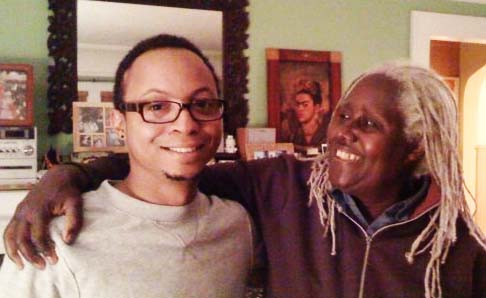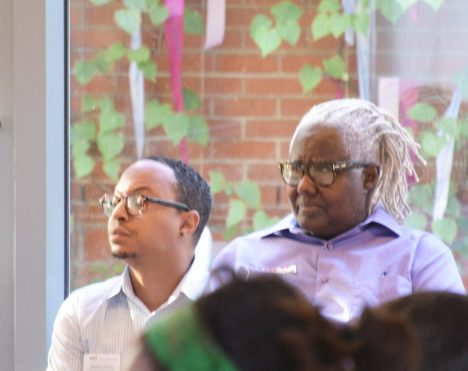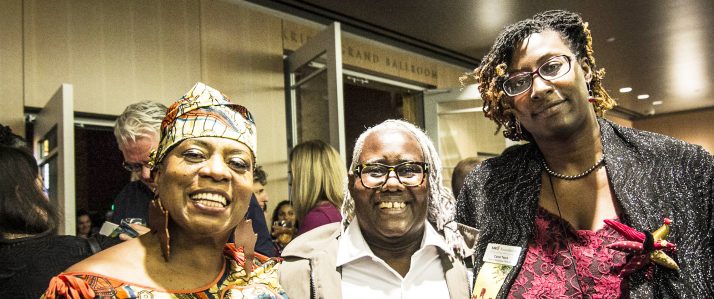I recently had the pleasure of sitting down over lunch with my long-time friend, community elder, and MRG volunteer and long time supporter, Romaine Harris. We talked about giving back and her experience visiting Giving Back: The Soul of Philanthropy, Reframed and Exhibited.
Stephan Herrera: What does giving back mean to you?
Romaine Harris: Giving back is a method of showing people appreciation and supporting them. I do this by finding ways to support the ideas that I have about what I see that the community needs and the purpose of organizations that I want to support in the community.

Long time friends Stephan Herrera, MRG’s Capacity Building Director, and Romaine Harris share with us their thoughts on giving back.
SH: In what ways have you given back or do you give back in community?
RH: One way is I volunteer. I volunteer with a world peace organization, I volunteer with MRG, and I volunteer for friends in need. I give back not just to organizations but also by supporting folks that reach out to me with problems they don’t seem able to solve on their own. It is meaningful for me to support friends going through difficult times with just an open heart and ears to listen. Most of the time they solve the problems just by having someone to witness their struggle.
SH: When did you first see people giving back? Who inspired you to start to give?
RH: My father and auntie showed me the importance of giving. One thing I saw as a kid was my father never changed his tires. When his tire was bad he would walk around the neighborhood and find a guy who wasn’t working and have them come and fix it. He knew that they needed money and he had expendable income that he chose to share with the community. My aunt also showed me different ways of giving back. For family, she would send $20 or $30 to each of her 14 grandkids on their birthday. She also was there to support her community when they needed her. Back in the day, when domestic violence was going on, you could not call some place to get support, but had to depend on your community. I remember one night a woman knocked on our door in the wee hours of the night and woke us all up. Auntie brought her in. It seemed that she was a victim of domestic abuse. Auntie gave her some first aid and just supported her through a troubling time. These acts by my family showed me the idea of giving.

Stephan and Romaine attend MRG’s Critical Community Conversation about Black Lives Matter.
SH: How has giving back benefited you and your community?
RH: At 72 years old, I need to find as many avenues as possible to give back because it is what I do for my community and it makes me feel good. I especially feel really good when I give and I don’t say anything to anyone about my giving back. If I help someone who is in need and I don’t ever mention it to anyone, it is like a precious jewel that I can keep to myself, which makes me feel inside like I have really contributed.
SH: Romaine, thanks for your joining us at the opening reception of Giving Back: The Soul of Philanthropy, Reframed and Exhibited as well as the follow-up civic engagement class. What did you think about these events?
RH: I loved it. I thought it shared a deep understanding about the ways one can actually contribute to society.
SH: How did the event and class change the way you thought about your own giving history?
RH: After the civic engagement training I thought a lot about a story that Alison and I reviewed. The story was about how this man trained his children to be philanthropists. It helped me to see how my own people taught me important lessons not through telling me but how they moved in the world.
SH: What were highlights from the events?
RH: My highlight of both was hearing from Valaida Fullwood, the woman who decided to actually make the exhibit manifest. She took her aunt Dora’s ethical practice and framed it in a very thoughtful way of learning and sharing with our community; that is a beautiful thing.
Another thing I learned at the civic engagement class was that everything that we do, that is not done for our own personal good, is actually helping the community and is civic engagement. The dollar that I spend on Street Roots every week and the other small things I do are giving back. As I talk about it actually I don’t think I give enough back. I need to give more.
SH: Anything else to share?
RH: I think this is wonderful for communities of color to see that it is not just the dollar bills that hit the table but it is also the hands that do the work, the feet that travel to do the work, the gas that you put in to volunteer to do the work. All of these things are important and are not to be overlooked. I really didn’t see myself as being a philanthropist but now I really do, I feel like I am philanthropist, it is really sweet. I think it is future-looking to bring this exhibit and share it with the community.
SH: Romaine, thanks so much for having lunch with me and sharing what giving back means to you.





